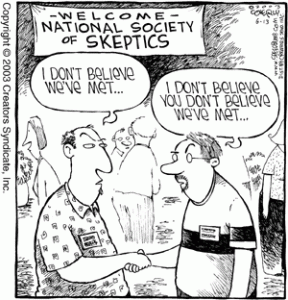In this week’s reading, G.E. Moore explores the concept of certainty in a direct attack on skepticism. He begins his argument with the supposition: “I know for certain that I am standing up” (Moore 361). Using this claim as an example, he goes on to highlight the fallacy of the justified true belief account of knowledge, suggesting it is impossible to establish true sureness over the supposition that one knows for certain when they are standing up. Moving broader, he offers that if one can never know for certain that they are standing up, they also can never truly know that they are conscious and not dreaming. As we human beings define our vitality by our ability to be self-aware, he essentially throws our entire existence into question.
As Moore further blurs the lines between dreams and reality, uncertainty and certainty, he proves that these concepts may not actually exist as the purely dichotomous entities that we usually assume. Instead, it is entirely possible that we can be deceived by “the evidence of our senses” (Moore 363). He states: “For if it is not certain that I am not dreaming, it is not certain that I even have the evidence of my senses that I am standing up” (Moore 363). In other words, if one lacks definitive evidence that they are not dreaming, that uncertainty can be extended over any supposition such as whether or not one is actually standing up.
Although this destruction of certainty would seem to upset and disturb most people (perhaps even send a philosophy student to the hospital), Moore handles this notion with relative tranquility. He accepts that we may never know anything for certain yet remains comfortable with the idea that it is highly unlikely that we are all constantly in a dream-like state. By looking at the matter from a quasi-probabilistic perspective, rather than an emotional one, Moore is able to withhold passing judgments and is more successful in dismissing skepticism.
If everyone lived as a skeptic, constantly refuting the idea of any truths including a “real world”, there would simply be no motivation or accountability. Moore would agree that while it is important to grapple with the notion of certainty, attempts to absolutely destroy it are neither productive nor factual-based. Trying to prove that one is not conscious is just as fruitless as searching for conclusive evidence that one is in fact dreaming. As frustrating as that notion may seem at first, Moore accepts it with relative ease and perhaps we all should too in order to survive in this uncertain world.
(I found this cartoon to be a perfect illustration of the frustrating and redundant nature of skepticism that Moore touches on)
http://atom-ecology.russgeorge.net/wp-content/uploads/2013/05/skeptic-cartoon.gif

I like how you touched on Moore’s relatively large amount of comfort with not having clear-cut answers. On page 363 he introduces the disjunctive syllogism “I either have the evidence of my senses that I am standing up or have a experience which is very like having the evidence of my senses that I am standing up.” This is not like the disjunctive syllogisms that I am used to; usually both provide a sort of answer. However, the second half of this disjunctive syllogism puts Moore in a very abstract sort of world. These two possibilities are very different from one another and I agree that for most people it would be hard to accept that either one can be true.
I also completely agree with Moore in needing to be curious but not so skeptical that everything is called into question, including one’s state of being. I think it is interesting that he turns the proof back onto the skeptics because this was a critical move. If anything can fit for P, then that means the very thought of dreams could be false. So it stops nowhere with the skeptical argument and they don’t really even know that they aren’t real because their basis for being in a dream could also be a dream. I think it is important to note that, if one could know there were dreams before, couldn’t they also say that since we have moments when we are dreaming, at a certain point we all know that we are not, our awake phase, so couldn’t we just be awake since we do know that there are possibilities of dreams we know there must be possibilities of the after awake phase because if not, we could not differentiate to the point to even know that dreams existed.
I also really like the cartoon you used! Because it’s like, get a grip already, how can we ever stop this never ending cycle of being skeptical. Like clearly, theres a point where we do know something because if we didn’t, how could we differentiate the different events and states of that concept. Like clearly if they haven’t met, he doesn’t believe that they have, but then the other guy going on like that leads to absolutely no resolve.
I like the title of your blog post “An Attack on Skepticism.” Moore is so obviously an anti-skeptic. What I like about Moore’s argument is that it summarizes what the skeptic thinks and he basically does the work for the skeptic. I agree with Moore’s arguments fully. There is no need to be skeptical about everything and everyone. If we simply use logical arguments, we can see what we know or believe. I like that Moore brings in the idea of memories at the end of his argument (the last page.) The idea of memories proves that maybe we are not dreaming because we have the ability to remember.